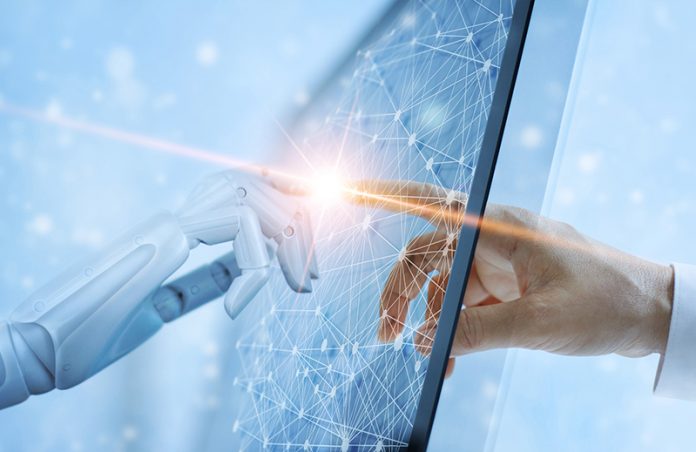An Introduction to the Special Report on AI and Humans by AiTH, NUS Business School
The development of artificial intelligence (AI) promises amazing opportunities for transforming our lives and the way we work. It will help elevate our human potential in ways we cannot yet see or even imagine. But what are the challenges that lie ahead? Amid the hype and excitement, there is a risk that allowing technology alone to dictate the course of development may bring with it as yet unknown threats to our human condition. Indeed, in 1965, the British mathematician I.J. Good already wrote, “An ultra-intelligent machine could design even better machines; there would then unquestionably be an ‘intelligence explosion’, and the intelligence of man would be left far behind.”
Of course, what does human intelligence mean and is it the same as the intelligence of a machine, which basically depends on recognising ones and zeroes? Despite this difference, it is nevertheless the case that, in line with the idea that we were able to replace our human body by steam engines, cars and so forth, with AI in the works we will be able to replace our minds. Hence, with the arrival of AI in our societies and organisations, it seems as if we have arrived in a phase of our human development where, for the first time, we face an existential threat that both our bodies and minds can be replaced and, by definition, man in his totality. And, if we are able to replace man by machine, what kind of world are we building?
Some critics have argued that by the rapid development of AI and the notion that we can now replicate our thinking, the expectations of the world of tomorrow may be based more than ever on a mechanistic, rational perspective that will fit the employment of AI more than it will fit the use of humans. At our Centre on AI Technologies for Humankind (AiTH), located at NUS Business School (Singapore), we believe that the initial idea behind our efforts to let algorithmic presence grow in our organisations is, and should always be, to optimise the workings of a humane society. The idea is not, and should never be, to upgrade and implement AI at such a level that we ultimately forget to serve the human aspect of our quickly developing society. The end user is human – not technology. We do not innovate AI applications to create a society where the end user becomes the algorithm itself. If we were to do so, then we would have to conclude that the goal driving today’s AI revolution is to develop the most perfect technology possible – without regard for the kind of society we will be creating. Moreover, if this is really the case, then we are developing technology solely for the sake of making technology perfect, and nothing else.
But are we really going to see, in spite of our present fears, this kind of transformation in which the machine will be put in the dominant position and thus colour the existence of the world of tomorrow? We believe that this will not be the case. The aim should always be to use technology for good and, in this case, that means employing AI in ways that benefit the human identity and the values that provide content to what it means to be human. This way, we can become even more efficient in being human and achieving better outcomes in line with our values.
Today, more than ever, organisations need to be very much aware of the kind of social value they want to create by means of their decisions. In fact, in the summer of 2019, the Business Roundtable, led by JPMorgan Chase CEO Jamie Dimon and including leaders from some of America’s biggest companies, announced that decisions made by organisations should reflect the interests of not only shareholders, but all stakeholders. Determining this kind of social value remains a human task. Indeed, although today the topic of AI ethics is a popular one in many debates, it remains reality that AI is about statistics and, therefore, does not have the sense of meaning and empathy to decide and reason about what is meant by moral intuitions, ethical implications and doing good for others. It is as Melanie Mitchell noted in her book Artificial Intelligence: A Guide for Thinking Humans: “even today’s most capable AI systems have crucial limitations. They are good only at narrowly defined tasks and utterly clueless about the world beyond.” If AI does not understand what the world means to humans and what it means to be a human in a social world, then it is not entitled to make ethical decisions on behalf of humans.
For all these reasons, at AiTH we believe that the development of AI technologies must be understood and examined in the context of collaboration and co-creation with humans. Our aim is to study, explore and develop deep insights into how AI technologies should be advanced with human-centred choices, promoting creativity and happiness whilst serving and enhancing human identity. To promote our human-centred view on technology development and what the future of work will look like in terms of human-machine collaboration, in this issue we present some of the thought leadership that has been developed at AiTH. Specifically, in this issue you’ll find a collection of six pieces representing research that is taking place at the intersection between technology, social sciences and humanities. We hope that you enjoy our insights and will consider it useful to your own thinking when it comes down to what role AI can and should be playing in the organisations you are leading and the business value that you wish to create.
About the Centre on AI Technology for Humankind
Artificial intelligence (AI) is touted as the new hero of our future society. With AI applications on course to match or even surpass the capabilities of human intelligence, this may be no exaggeration. The evolution of AI promises to fundamentally transform how our future society will look and function. It promises many exciting opportunities, yet this development needs to serve a purpose and that purpose must be defined by the goals of humanity. In building our future society, we have an obligation to safeguard the capabilities and values that define humanity – compassion, forgiveness, empathy and proactive thinking.
We therefore believe that technology cannot and should not be looked to for guidance. Rather, it is our responsibility as designers, developers and collaborators to guide the development and employment of AI by means of our core set of human values. This responsibility implies that we need to research, explore and educate on ways of ensuring that we, as the ultimate end user, are able to adopt a human-centred mindset when bringing AI into our daily activities. At AiTH, we aim to unite talented researchers, thought leaders, business people and entrepreneurs in a scholarly environment to ensure that the AI we develop today will bring a bright and humane society tomorrow. I invite you all to join us in this exciting adventure.
VISION
To be Asia’s leading centre for thought leadership, ensuring that advances in AI technology improve the human condition through innovative research, education and policy-making.
MISSION
To develop and promote a human-centred mindset in the engineering of AI technology.
OUR VALUES
Tolerance
Whilst the objective of AI development is to optimise, it raises the risk of promoting a mindset focused solely on an end goal of perfection. We believe a human-centred society should be accepting and forgiving of failure and demonstrate tolerance. Tolerance allows failures to happen, driving our curiosity to explore solutions that would not otherwise be thought of in a blinkered quest for perfection alone.
Humanity
Any exploration of technology should serve the well-being of humans and promote the values of compassion, forgiveness and empathy that make us who we are. We believe this humanity should be at the core of developments in AI, so that any change in the design of our environment is fitting to our purpose.
Integrity
As a collective seeking knowledge to help us achieve a technology-empowered world built around human-centric choices, we value diversity in our perspectives and approaches. We consider values of fairness and ethics when assessing the disruptions technology may bring, and advocate for treating everyone with dignity and respect.
Mindful automation
We strive to be attentive to the consequences of automation at all levels in our society and organisations. We believe in a reflective and mindful attitude towards studying AI and automation efforts without challenging the notion of what it means to be human.
Broad-minded innovation
By embracing diversity of thought, we aim to create an environment focused on delivering the most creative and human-centred solutions for the advancement of AI technologies. We actively avoid a mindset where technology innovation is primarily seen as an end in itself, and emphasise the broader purpose of innovation for society and all its stakeholders.
Sincerely,

Director and Founder of the Centre on AI Technology for Humankind (AiTH)
Website AiTH: https://bschool.nus.edu.sg/aith/
Website David De Cremer: www.daviddecremer.com






































